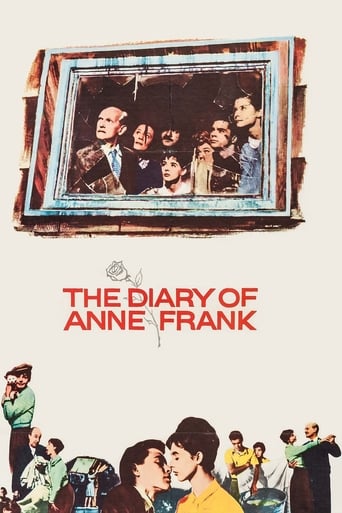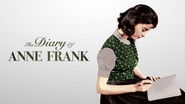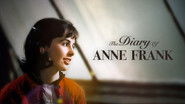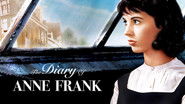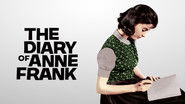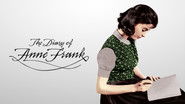JohnHowardReid
A George Stevens Production. Copyright 1959 by 20th Century-Fox Film Corp. New York opening at the Palace: 18 March 1959. U.S. release: March 1959. U.K. release: July 1959. Australian release: 1 October 1959. Running times: 170 minutes (USA and UK), 178 minutes (Aust).NOTES: First published in 1952, the book became an almost immediate best-seller and was translated into 21 languages. The play opened on Broadway at the Cort Theatre on 5 October 1955 and won the Pulitzer Prize, the New York Drama Critics Award and the Antoinette Perry Award. It was produced by Kermit Bloomgarden and directed by Garson Kanin; Susan Strasberg was Anne, Dennie Moore was Mrs. Van Daan and Jack Gilford was Mr. Dussell. In the film, Schildkraut, Huber and Jacobi are repeating their original Broadway roles... Stevens reportedly screened 10,244 applicants for the role of Anne before deciding on New Jersey-born model, Millie Perkins. The film won three Academy Awards: Best Supporting Actress, Shelley Winters, Black-and-white Cinematography, William C. Mellor (only — the 2nd unit scenes photographed by Jack Cardiff were presumably thought to be inferior to Mellor's studio work), and Black-and-white Art Direction, defeating "Career", "The Last Angry Man", "Some Like It Hot", and "Suddenly Last Summer".On the year's "Ten Best" lists, number 2 on the Film Daily annual poll of American film critics, number 5 on New York Journal American, number 10 for Gerald Pratley, number 4 for the National Board of Review, number 1 for the Pittsburgh Post-Gazette, number 3 on The New York Daily Mirror, and tied with The Nun's Story for 2nd place on the Filmfacts composite listing. In alphabetical lists figured on Time, John Springer, New York Times, New York World Telegram, Milwaukee Journal.Although the play ran a highly successful 717 performances, returning its astute backers something like ten times their original investments, the film did far less well. Including the cost of the screen rights and being aware of Stevens' ultra-expensive working methods, you'd be looking at a negative cost of at least $3 million — probably a lot more. Perhaps the story was better left to the East German DEFA's 20-minute 1958 "A Diary for Anne Frank" which packs an enormous amount of actuality background material (stills, newsreels, documents) into its well-researched account.COMMENT: Slow-moving, but inspiring. Very much a filmed stage-play, rather blandly directed, yet somewhat heavily theatrical. Despite her stunning movie debut in the title role, Millie Perkins' subsequent career — "Wild in the Country" (1961), "Ensign Pulver" (1964), "Wild in the Streets" (1968) — didn't capitalize on her potential. Miss Perkins is a Jean Seberg in reverse.The other players try hard (perhaps too hard) to gain dominance over the central character. Shelley Winters come off best, and Diane Baker impresses in a small role, but Schildkraut, Wynn and Jacobi act as though they were treading the boards on Broadway instead of miming in front of a movie camera.OTHER VIEWS: A masterpiece. — Time. A surprisingly ordinary movie. — Films In Review. Profoundly moving... A film for which the industry can take a prideful bow. — Variety. Often magnificent. — Saturday Review. A masterpiece. — New York Herald Tribune. Shows Hollywood at its most honorable and least imaginative. — Monthly Film Bulletin. Easily the finest film 20th Century-Fox ever made. — Samuel Goldwyn.
Ross622
This movie was the first film ever made that dealt with the Holocaust, and is one of the best films in its genre along with Steven Spielberg's "Schindler's List" (1993), and Quentin Tarantino's "Inglourious Basterds" (2009). The film is also the only Hollywood film to deal with the two years where Anne Frank her family, and two other families are hiding in an attic from the Nazis. At the time the film was being made George Stevens who directed and produced the movie took a big gamble with casting an unknown actress in the title role, that actress was Millie Perkins. Despite being 21 years old when she was making the movie Perkins shines in her film debut as Anne Frank a young teenage girl who writes a diary of the events that happen during her time hiding from the Nazis. During the film we get to know each of the characters thanks to a well-written script, and William Mellor's excellent cinematography. One thing that I've noticed while watching the movie was this movie was a more family oriented movie than any other Holocaust movie I've ever seen, and it was still effective. George Stevens was one of the most ambitious filmmakers of his generation along with other legendary directors like John Ford and Howard Hawks and Stevens' direction for this movie is no exception to his greatness as a filmmaker. Also I was also on the edge of my seat because of Alfred Newman's haunting and Oscar nominated score which I felt my hairs raising. Though movies set in different countries during World War II that were made during the "Golden Age" of Hollywood is that none of the actors use accents which made me feel like I was watching American Jews hiding from the Nazi army in Holland, thanks to mostly lackluster performances which is very disappointing for A George Stevens movie. Diane Baker is very good here as Anne's sister Margot, as well as an excellent supporting cast including Joseph Schildkraut (who won an Oscar for his performance in "The Life of Emile Zola") as Anne's father Otto, Shelley Winters won an undeserved Oscar for her performance as Mrs. Van Daan, Gusti Huber as Anne's mother, Lou Jacobi as Mr. Van Daan, Ed Wynn's Oscar nominated performance as Mr. Dussell I found to be annoying and mean spirited. Also Richard Beymer is also very good as the only child of the Van Daan family Peter who happens to be Anne's love interest. Though this is one of the finest films of 1959 it isn't a great film because I feel it would have been a much stronger and much more effective film if the actors had put more dedication and effort into their performances. But it was still emotionally effective as a movie.
D Lindsey
I do not know why you insist on listing Gusti Huber as Mrs. Frank when Joan Plowright is the obvious actress. If you look at Ms. Plowright's credits you will see she played Mrs. Frank. Joan did an amazing job with the role. I always knew it was her. So in watching it today again, after so many years and seeing ms. Huber listed, I am very confused. She was even listed in the opening credits of the actual movie. Does anyone know what happened? Of all the versions of this movie, this one was the most profound and left the longest lasting effects. I have watched every version of the movie, play , even a dance rendition and nothing can compare to this movie. I feel sad for anyone who does not catch this one first.I always thought it so kind and generous that Mr. Frank shared this very personal part of his life with us and wish I had a chance to thank him before he died.
gizmomogwai
I just finished reading the diary of Anne Frank and was moved. As you probably already know, Anne Frank was a German-born Dutch Jewish girl who went into hiding with her family and another family during the Holocaust. The majority of the movie takes place in their hiding spot. There are also added post-war scenes at the beginning and end of the movie that Anne of course couldn't have written, because she didn't survive.I was curious to see this movie, which I had only seen two scenes of on TV- Anne not throwing away her yellow star because it's a Star of David, and Mr. Van Daan drawing fury for stealing food. Neither scene is from the actual diary. There's the rub- the best parts of this movie are lifted directly from the book, but what's added, changed or left out is no improvement. Anne's diary reads as good as fiction already, so I don't think there was much need to "dramatize" it. Some scenes- like the characters confessing their sins on D-Day- come close to sappy, and Anne never really reconciled with her mother. I also wasn't very impressed with the actress playing Anne in this film. By all means, see the movie- but don't see the movie instead of reading the real thing.
